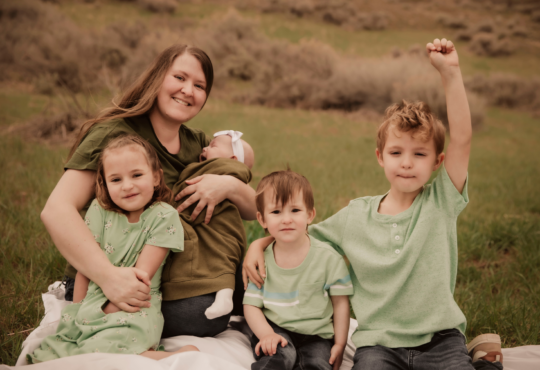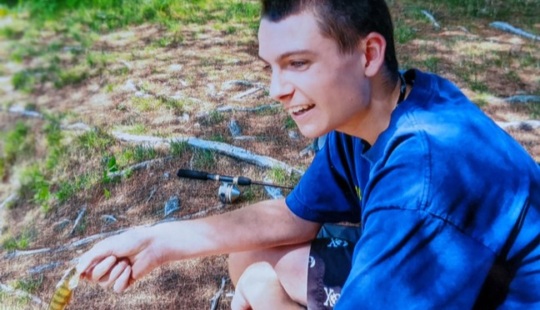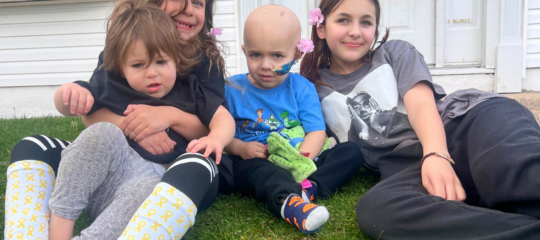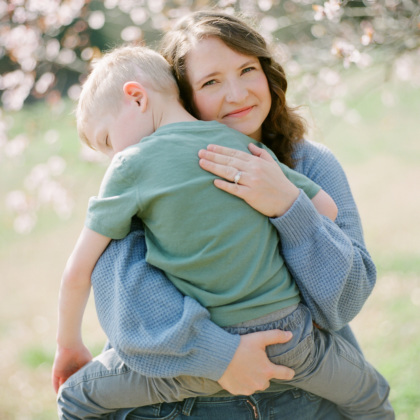
Ethan: Resilient through a Low-Grade Brain Stem Glioma Journey

Ethan, the eldest son of the family, was born on May 15, 2000. He was compassionate, loving, and genuine, and dreamed of becoming a rap artist. At age six, he started a long journey with a low-grade brain stem glioma.
Ethan’s tumor was discovered after he started having blurry vision, a hard time hearing, and would wake up in the middle of the night vomiting. After he was diagnosed at six years old, he had his first surgery to relieve a buildup of fluid in his brain called hydrocephalus. This surgery left Ethan visually impaired. He later had his first craniotomy and was set up with a treatment plan. He endured 18 months of chemo, ending when he was eight years old.
This process was difficult for his family who had to navigate learning about brain tumors and visual impairment in tandem. They did a lot of research on their own for services to help with modifications at home and school. Ethan didn’t like using a cane, so his family stuck with sighted guides.
Once he was done with treatment, Ethan was able to attend school more often since he no longer had side effects from chemotherapy. He used modifications like enlarged printing for his schoolwork and was able to play with modified card and board games at home.
When he was in fourth grade, Ethan’s school taught him braille, which was much easier as the large print was becoming too difficult for him, and many of his friends at school sight-guided him. He started showing interest in rap music, writing lyrics from age 12 to 17.
“He was very resilient, relentless, determined, and motivated to not let the disease or his blindness stop him from doing as much as he possibly could with his life and enjoying as much as he possibly could with his life. He never gave up. The disease just basically became more than he could fight,” says his mother, Vicki.
The smart, social, and determined Ethan was excited to start high school when a routine MRI showed his tumor was growing again. When he ended up with hydrocephalus, doctors did another craniotomy, which left him completely blind.
Children with brain cancer can’t wait another week, another day, another minute for your support. When you donate to the Pediatric Brain Tumor Foundation, you help fund life-changing research and provide families with the resources and support they need. Don’t let pediatric brain cancer steal another future.
Ethan spent his freshman year in and out of the hospital after the shunt doctors put in became infected. His sophomore and junior years were better – he was able to go to school more regularly and had a social life with his friends.
A few months into his senior year of high school, a second tumor was discovered. At first, doctors were not worried about it, but Ethan started fainting and having seizures. In March 2017 at seventeen years old he ended up in the hospital from a seizure. After he returned home from the hospital, he had to learn how to do some tasks like how to walk with a cane. However, he was also partaking in new eighteen-year-old activities like opening his own checking account.
In September, the day after Labor Day, Ethan was non-responsive after a hemorrhage. Doctors didn’t think he would make it through the night, but he did. After additional procedures and monitoring, his doctors suggested that he enter a nursing home so he could have skilled care and build enough strength to come home.
Months later in May doctors discovered the tumors had spread through his brain and there were no more treatment options available. He entered hospice and one month later passed away at age 18. Vicki shares that Ethan was never expected to pass away. His prognosis was that his tumor would dissolve or stabilize by the time he was 23.
Ethan left a huge impact on the world, and any recognition and remembrance of him is very comforting for his mother and family. Through her grief journey, Vicki found the most support from other parents in the Pediatric Brain Tumor Foundation’s peer-to-peer mentoring program, her online Cancer and Afterlife groups, and grief therapy.
“Everyone grieves very differently and everyone’s experience after they lose their child is very different. Some parents have found that they pretty much would lose everybody from their families and friends, and that’s been the case for me mostly. For those types of families, I would say to really reach out to providers who specialize in grief and get involved in support groups for grieving parents. Sometimes you make new friends in those groups too.”
No parent is prepared to hear their child has a brain tumor, and the journey can be overwhelming and lonely. Through resources like our peer-to-peer mentoring program and virtual support groups, the Pediatric Brain Tumor Foundation is there for families every step of the way.
You can bring hope and healing to more families by donating toward our year-end campaign at www.curethekids.org/holiday2022. If you or a family you know need support this holiday season, contact us at 800-253-6530 ext. 3 or [email protected] to speak with a member of our Family Support team.
Related Stories


Advocacy Takes Many Forms – Gretchen Spreads PBTF’s Mission via Pageant Competitions
“I finally found my community, and it was life-changing,” says Gretchen about finding the Pediatric Brain Tumor Foundation and participating in a Ride for Kids event in 2017 when she was 16. “It took me almost 12 years to find people that I could actually have a conversation with [about my diagnosis and treatment], and my mom and dad felt that way too. It was an immediate bond with these families that we were meeting for the first time.”

Mick: A Childhood On Hold
"Children should not have to go through this disease and its treatments. You only get one childhood, and it hurts my heart to know that my son’s got taken away."
Related Updates
Accelerating Kids' Access to Care Act: Improving Healthcare for Children Across State Lines
The Accelerating Kids’ Access to Care Act, passed the U.S. House of Representatives on September 17 to improve children’s access to essential health care, while eliminating administrative burdens for providers and states.
Groundbreaking Voice of the Patient Report for pediatric low-grade glioma (pLGG) published by Pediatric Brain Tumor Foundation
“This report lays groundwork to improve the experience of people living with this disease,” said Dr. Sanjay Gupta, CNN’s chief medical correspondent, one of the country’s leading neurosurgeons, and a member of PBTF’s Board of Directors. “I believe it shines a much-needed spotlight on the wide-ranging and extensive challenges that this type of tumor causes for patients and their families, and I am hopeful that this moment is a significant milestone for this community.”
Related Resources
Survivor Support Groups
About Pediatric Brain Tumors


